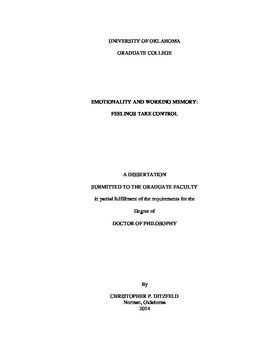| dc.description.abstract | Three studies examined the relationship between working memory capacity (WMC) and individual differences in emotionality. Applying a flexible cognition approach, conditions of cognitive narrowing (low WMC) and cognitive broadening (high WMC) were predicted based on (1) the motivational properties of affect states (action-deliberation tradeoff) and (2) negative-positive emotionality. Namely, high-arousal states (anxiety/excitement) were predicted to restrict WMC (action focus) whereas low-arousal states (sadness/calm) were proposed to expand WMC (deliberation focus) in highly emotional individuals (negative/positive emotionality). In Study 1, behavioral inhibition and neuroticism were associated with generally high WMC under baseline conditions. Thus, negative emotionality was associated with high cognitive-control ability. In studies that followed, participants mentally relived a past emotional event (mood induction) prior to completing the automated operation span task (WMC measure). In Study 2, high trait anxiety was associated with low WMC in an anxious (but not calm) mood condition. Thus, anxious conditions compromised WMC in anxiety-sensitive individuals. In Study 3, negative (positive) emotionality was associated with low (high) WMC in a nervous condition but high (low) WMC in a sad condition. Additionally, positive emotionality was associated with low WMC in an excited condition. Calm mood had no discernible effect on WMC. These findings highlight a dynamic relationship between emotion and executive functioning, and implications for self and emotional experiences are addressed. Importantly, these data suggest that executive functioning, considered critical to successful emotion regulation, is modulated by emotional states themselves. | en_US |
